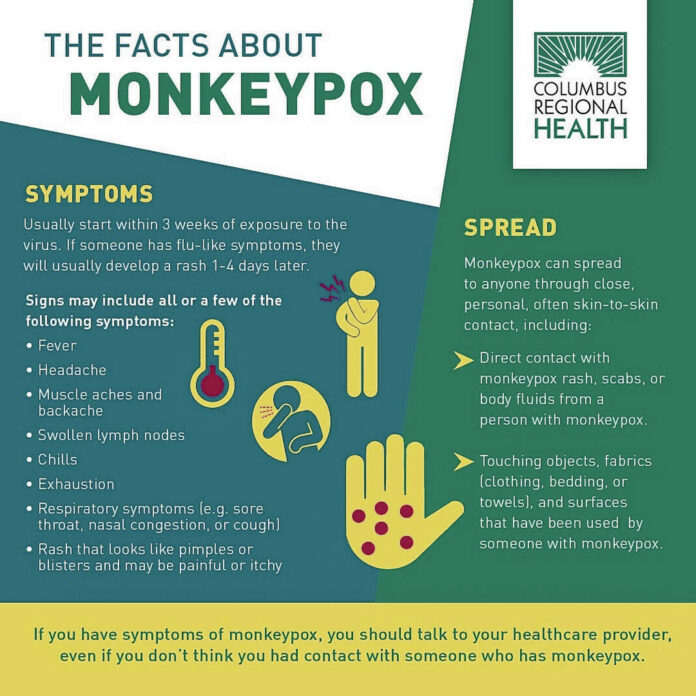Bartholomew County health officials are monitoring the expanding outbreak of monkeypox that has infected more than 11,000 people in the United States, saying that it is “only a matter of time” before the once-rare disease is detected locally.
Monkeypox is a virus that originates in wild animals like rodents and primates, and occasionally jumps to people, The Associated Press reported. The virus, which belongs to the same family as smallpox, is endemic in parts of Africa. But this year more than 31,000 monkeypox cases have been reported in countries that historically don’t see the disease, including the United States.
Earlier this month, the U.S. declared a national public health emergency in an effort to slow the outbreak, according to wire reports. The announcement frees up money and other resources to fight the virus, which may cause fever, body aches, chills, fatigue and pimple-like bumps on many parts of the body.
As of Friday, there had been 78 confirmed cases of the virus in Indiana, according to the Centers for Disease Control and Prevention. Bartholomew County health officials and Columbus Regional Health were not aware of any local cases of the virus last week.
“I do believe it is only a matter of time before we start seeing some cases locally,” said Bartholomew County Health Officer Dr. Brian Niedbalski.
The monkeypox virus spreads through prolonged skin-to-skin contact, including hugging, cuddling and kissing, as well as sharing bedding, towels and clothing, according to wire reports. The people who have gotten sick so far have been primarily men who have sex with men.
But health officials emphasize that the virus can infect anyone if they are in close contact with an infected person or fabrics that touched an infected person. Two children in Indiana had been infected with the virus as of July 29, the Indiana Department of Health said.
CRH officials said that the hospital system is in a “heightened level of awareness” and “monitoring the situation.”
“It is something that we want the public to be paying attention to, especially now, because it has been elevated to a national public health emergency,” said CRH spokeswoman Kelsey DeClue. “…It is something that we’d like the public to take seriously.”
Local officials said any outbreak of a virus is concerning, but most of the monkeypox have been mild and haven’t required hospitalization. No one in the United States had died as of Aug 4, though a few deaths have been reported in other countries.
Monkeypox requires very close contact to spread, so it is not likely to prompt big waves of disease like COVID-19, which can be transmitted in the air by people with no symptoms, according to wire reports.
“This would mostly be an outpatient illness that we’d be managing, unlike COVID, which is very impatient based,” DeClue said. “It is typically not very severe, and typically doesn’t result in hospitalization.”
Currently, there are no treatments specifically for the virus, though some antiviral medications and vaccines developed to protect against smallpox can be used to prevent and treat monkeypox patients, as the two diseases come from the same virus family, according to the CDC. CRH officials said the hospital system has access to those medications should a patient need them.
Limited vaccine
Last week, U.S. health officials authorized a plan to stretch the nation’s limited supply of monkeypox vaccine by giving people just one-fifth the usual dose, citing research suggesting that the reduced amount is about as effective, according to the AP.
The so-called dose-sparing approach also calls for administering the Jynneos vaccine with an injection just under the skin rather than into deeper tissue — a practice that may rev up the immune system better. Recipients would still get two shots spaced four weeks apart.
The highly unusual step is a stark acknowledgment that the U.S. currently lacks the supplies needed to vaccinate everyone seeking protection from the rapidly spreading virus.
That includes 1.6 million to 1.7 million Americans considered by federal officials to be at highest risk from the disease, primarily men with HIV or men who have a higher risk of contracting it. Vaccinating that group would require more than 3.2 million shots.
As of July 29, Indiana has received 3,232 doses of the Jynneos vaccine, state officials said. Due to limited vaccine supply, vaccines are initially being prioritized for close contacts of positive cases to prevent severe disease. Additional vaccine is expected soon, and eligibility will be expanded to groups at high risk for exposure as supplies increase.
It is not the first time that monkeypox has been detected in the United States. In 2003, 47 people in six U.S. states had confirmed or probable cases, according to wire reports. They caught the virus from pet prairie dogs that been housed near imported small mammals from Ghana.
Though the outbreak continues to expand in the U.S., Niedbalski said local residents do not need to make “any alterations in their day-to-day activities” at this time.
“Since monkeypox has now been declared a national health emergency, it definitely warrants my attention as health officer,” Niedbalski said. “Hopefully, individuals at increased risk or those who have had direct contact with monkeypox will seek medical attention immediately if they have a rash that is suspicious. Right now, I don’t think our community needs to be making any alterations in their day-to-day activities.”
Where to learn more
For more information about monkeypox, visit www.cdc.gov/poxvirus/monkeypox/index.html and www.crh.org/healthy-tomorrow/healthy-tomorrow/2022/08/10/the-facts-about-monkeypox.





